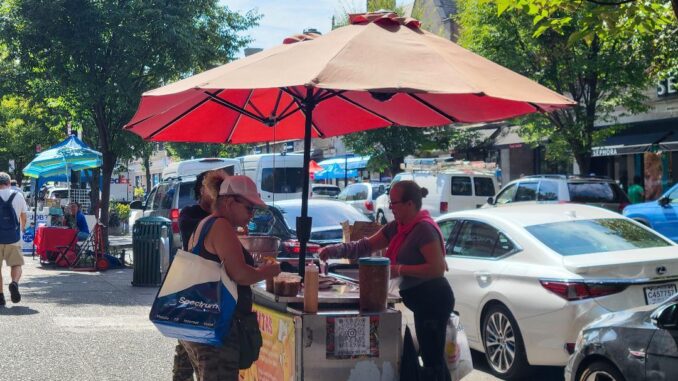
BY IAN M. TORRES
This past week, many local food vendors gathered at a rally in Corona to protest their right to sell and prepare food from carts in parts of Queens, where a recent crackdown by the New York Police Department and Department of Sanitation has led to an uncertain future for many vendors in Jackson Heights and Corona.
This comes on the heels of one instance in late August where, according to Documented, an independent nonprofit news source, a food vendor and Ecuadorian immigrant named Blanca Alvarado was packing up for the day when a group of police officers surrounded her. “It felt like an ambush,” she said. “By the time I realized what was going on, the police were all around me asking for a license.”
Several police officers demanded to see her vending license. It was not the first time she had dealt with police. Alvarado did not possess a general vendor permit that would allow her to operate her own food cart, but she complied, giving them what she did have – but her food handling license only allowed her to work at a food cart, not operate one.
Alvarado was issued three citations, including one for vending without a permit, and said police barred her from retrieving her cart. Videos taken by Alvarado’s friends on their phones and shared with Gothamist show police loading the cart into a garbage truck at Junction Boulevard and 37th Avenue, in Corona, Queens.
“The truth is, I’m desperate,” a tearful Alvarado, 44, told Gothamist in Spanish, adding that she hasn’t found other work since her cart was confiscated. “I can’t pay the rent.”
Carina Kaufman-Gutierrez is Deputy Director of the Street Vendor Project, a membership based organization fighting for the rights of street vendors and helping to create small businesses for immigrants and entrepreneurs in New York City. She said the 115th Precinct has repeatedly violated the 14th Amendment of the U.S. Constitution, as well as the NYPD’s own standard property vouchering protocol, when they have destroyed the vendors’ carts without an opportunity to dispute the confiscation of property.
“The NYPD should be upholding the law, not breaking it and destroying the livelihoods of immigrant small business owners who support our neighborhoods with fresh, affordable food,” Kaufman-Gutierrez said.
Magu, a Turkish immigrant who came to the United States and lives in Brooklyn, started his food vending business six years ago. “I’m doing that business like five years, this spot in more than three years. I’m doing that here and I have also other places,” he said.
Street vending was and has been his first and only business here in America, where he operates a corner fruit stand, but it hasn’t come easily for him. “When they come, they giving the ticket and you know how much was for depends. Sometimes they’re using $500, sometimes $250, sometimes a $1,000,” he said. “If your roof is not good, they give me the $1,000 ticket for roof that I have.”
Magu explained that when he is approached by the police, its scares customers away, perhaps thinking he is doing something wrong. “I don’t feel comfortable because you know when they come, the customer also thinking what’s going on here because when its police coming, like more than 20 police come in there,” he said.
In recent protests, hundreds of vendors, many of them immigrants, have renewed their calls for City Council to lift the caps on vendor licenses and permits, and “decriminalize” vending by removing criminal penalties for vending offenses.
“We are losing money too, like every time they take more than $1,000 stuff from me that’s not good for us because we’re not making much money,” he said.
The Department of Sanitation is currently the city’s main agency in charge of vendor enforcement. Despite attempts to contact the 115th Police Precinct and Community Affairs, neither one could be reached for comment.
